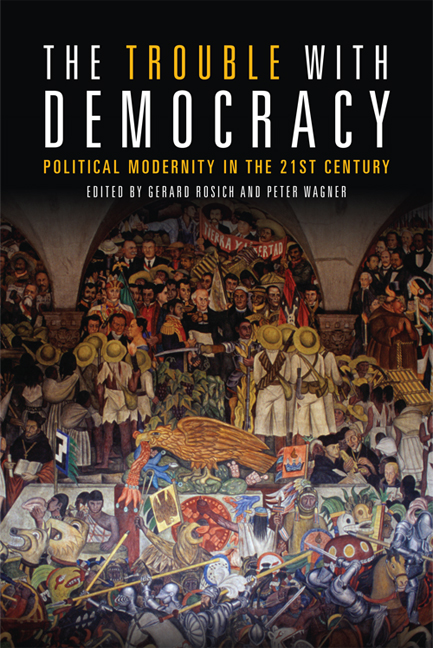Book contents
- Frontmatter
- Contents
- Acknowledgements
- List of Contributors
- 1 Introduction: Re-Interpreting Democracy for Our Time
- 2 Autonomy in and between Polities: Democracy and the Need for Collective Political Selves
- 3 Rethinking ‘Modern’ Democracy: Political Modernity and Constituent Power
- 4 Democratic Surplus and Democracy-in-Failing: On Ancient and Modern Self-Cancellation of Democracy
- 5 Setbacks of Women's Emancipation (Condition, Consequence, Measure and Ruse)
- 6 Political Modernity, Democracy and State–Society Relations in Latin America: A New Socio-Historical Problématique?
- 7 Communitarian Cosmopolitanism: Argentina's Recuperated Factories, Neoliberal Globalisation and Democratic Citizenship. An Arendtian Perspective
- 8 Middle-Classing in Roodepoort: Unexpected Sites of Post-Apartheid ‘Community’
- 9 Democracy and Capitalism in Europe, Brazil and South Africa
- 10 From Realism to Activism: A Critique of Resignation in Political Theory
- 11 The World as We Find It: A Suggestion for a Democratic Theory for Our Times
- 12 Epilogue: Democracy as Capacity for Self-Transformation
- Index
8 - Middle-Classing in Roodepoort: Unexpected Sites of Post-Apartheid ‘Community’
Published online by Cambridge University Press: 05 September 2016
- Frontmatter
- Contents
- Acknowledgements
- List of Contributors
- 1 Introduction: Re-Interpreting Democracy for Our Time
- 2 Autonomy in and between Polities: Democracy and the Need for Collective Political Selves
- 3 Rethinking ‘Modern’ Democracy: Political Modernity and Constituent Power
- 4 Democratic Surplus and Democracy-in-Failing: On Ancient and Modern Self-Cancellation of Democracy
- 5 Setbacks of Women's Emancipation (Condition, Consequence, Measure and Ruse)
- 6 Political Modernity, Democracy and State–Society Relations in Latin America: A New Socio-Historical Problématique?
- 7 Communitarian Cosmopolitanism: Argentina's Recuperated Factories, Neoliberal Globalisation and Democratic Citizenship. An Arendtian Perspective
- 8 Middle-Classing in Roodepoort: Unexpected Sites of Post-Apartheid ‘Community’
- 9 Democracy and Capitalism in Europe, Brazil and South Africa
- 10 From Realism to Activism: A Critique of Resignation in Political Theory
- 11 The World as We Find It: A Suggestion for a Democratic Theory for Our Times
- 12 Epilogue: Democracy as Capacity for Self-Transformation
- Index
Summary
The last thirty years of capitalist development have, especially in what used to be called the advanced capitalist countries, generated paradoxical, if not contradictory trends. The ‘great crisis’ of 2008 was rooted in an ideological failure. Marching under the banner of the free markets, writes James K. Galbraith, the state permitted the globalisation of finance; the unrestrained growth of financial derivates, tax havens, regulatory arbitrage and the carry trades. In short, state authorities in the USA, in the UK and elsewhere acted as if the market really was a self-regulating mechanism functioning according to natural laws. The result was the first full-fledged credit collapse and debt deflation since 1930. At the very moment that governments in the West were treating markets as quasi-natural (quasi-religious) systems, capitalist firms themselves were often moving in a different direction. Luc Boltanski and Eve Chiapello have documented how in France, in particular, large corporations took on board the anti-capitalist critique of alienation and bureaucracy to develop new models of management and workplace organisation. The paradox is often not sufficiently noted.
This chapter argues that there was another, no less remarkable, shift in capitalism. During the 1970s, but especially from the 1980s, the bundle of rights associated with private property mutated in many countries to accommodate historically non-capitalist modes of social organisation. This chapter will unfold in three parts. In the first section, it argues that there has been an innovation in the rights of private property, especially in the area of residential property. Starting in the 1960s, though only really coming into its own in the 1980s, the rights of private property have been grafted onto a regime of communal ownership. In the condominium (or sectional title estate), individual property rights are exercised in and through a system of collective control and management. During the very period of capitalist ascendancy, in other words, historically non-capitalist forms of sociability were being elaborated from within the very holy ark of capitalism itself, the relation of private property.
Not only has a novel regime of ownership emerged as a legal instrument, but from the 1980s this legal regime has given rise to massive new social phenomena in the USA and increasingly across Asia, Africa and the Middle East.
- Type
- Chapter
- Information
- The Trouble with DemocracyPolitical Modernity in the 21st Century, pp. 185 - 211Publisher: Edinburgh University PressPrint publication year: 2016

